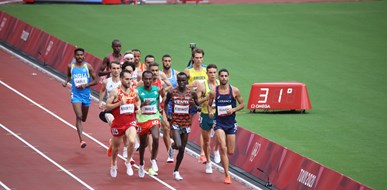[Sports law] Zooming in on the International Olympic Committee’s strategic framework on human rights
Published 11 October 2022
Benard Keter's advance to the finals after he competed in the first round of men’s 3,000 meter steeple chase at the 2020 Summer Olympic Games July 30, 2021. Photo by Brittany Nelson, Wikimedia.
In a new blog post on Verfassungsblog, Asser researchers Antoine Duval and Daniela Heerdt have a closer look at the long-awaited “Strategic Framework on Human Rights” (Framework) that the International Olympic Committee (IOC) published early September.
The new Framework presents both an overarching approach and concrete action plans for the IOC to address their human rights risks and impacts. It does so along three spheres of responsibility: the IOC as an organisation, the IOC as owner of the Olympic Games, and the IOC as leader of the Olympic Movement.
In their blog post, authors Duval and Heerdt present the Framework’s contents and assess if it could have a ‘transformative impact’ on the way in which the Olympic Movement addresses human rights. They highlight both the potential of the Framework to change the way the IOC operates and how the Olympics are organised, and the many unknowns remaining regarding its actual transformative impact and concrete implementation in practice.
As Duval and Heerdt write: “While on paper (the Framework) contains many commitments which could affect the governance processes of the organisation, much will depend in practice on how these commitments will be implemented. Will the IOC dedicate the necessary resources and rewards for human rights to be taken seriously inside its organisation?”
Roadmap for human rights
According to the authors, the “Framework is neither a detailed outline of a human rights policy, nor a statutory commitment to human rights, and does not bind the IOC, legally speaking, to human rights standards. Nevertheless, some of its commitments can probably be invoked, for example before the CAS, to support human-rights compatible interpretations of the Olympic Charter or the application of human rights standards in disputes involving the IOC. The Framework constitutes a roadmap for what the IOC plans to do to embed human rights into its policies and processes. Moreover, by formulating clear actions and targets it gives civil society the opportunity to monitor the IOC’s achievements and to hold it accountable, mainly in the courts of public opinion, if it fails to fulfil its ambitions.”
Duval and Heerdt conclude: ‘For now, we can say for sure that after the publication of this framework it will be increasingly difficult to argue that human rights are not part of lex sportiva and applicable to sports governing bodies (SGBs), as for example the World Athletics did after the Caster Semenya award. A few years ago, the late Prof. John Ruggie referred to his work advising FIFA to adopt and implement human rights commitments as “adding human rights punch to the lex mercatoria”, he probably should have referred in his title to lex sportiva. In any event, the IOC’s Strategic Framework follows a similar path, the fundamental question being how strong the punch will ultimately be.”
Read the full blog.
Governing international sports in times of war: Sports Governing Bodies and the Russian invasion of Ukraine
Sport is often presented by Sports Governing Bodies (SGBs), and in particular the International Olympic Committee, as apolitical. This apolitical ideal of international sports is not only a founding myth of the Olympic Movement, it is actively pursued by SGBs through their private regulatory powers and has hard consequences for athletes, clubs, sport officials alike.
Watch the discussion on the private regulatory powers and the SGBs reaction to the Russian invasion of Ukraine.
- Prof. Carmen Pérez (Universidad Carlos III de Madrid), who wrote a blog on the reactions of SGBs to Russia’s invasion
- Dr. Daniela Heerdt (Asser Institute and Centre for Sports and Human Rights), who is the co-author of a blog mapping the reactions of SGBs to Russia’s invasion
- Carole Gomez (University of Lausanne and Institut de Relations Internationales et Strategiques), who has been interviewed by international media on the issue (see here and here). Register here.
[Summer programme] Sport and human rights
27 - 30 June 2023
Join us for our unique training programme on ‘Sport and human rights’ jointly organised by the Centre for Sport and Human Rights and the Asser Institute and hosted by FIFPRO. Focus on the link between sport and human rights and zoom in on a number of challenges underlying this link, such as the human rights impacts of day-to-day sports, the rights of athletes, gender and sports, remedies for sport-related human rights harms, the normative framework and applicability of the UNGPs in the sporting context, and more. Register here.
